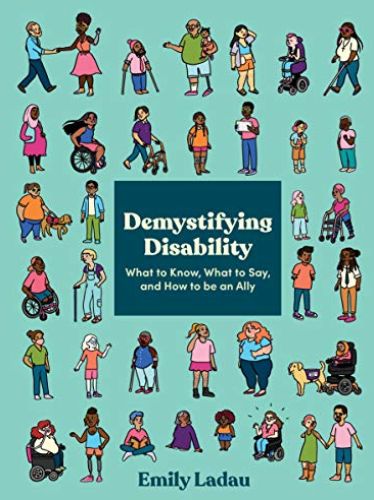Disability rights activist, writer and speaker Emily Ladau offers a primer for the nondisabled on the rights of people with disabilities and how best to engage and support them.

A Natural Part of Life
Disability rights activist, writer and speaker Emily Ladau provides an easy-to-use guide for the nondisabled who seek to understand and support disabled people. Ladau, the editor in chief of the Rooted in Rights blog, a platform amplifying narratives on the disability experience, and cohost of The Accessible Stall podcast, covers the history and current state of civil rights advocacy for disabled people and exposes the dangers of harmful stereotypes and ableism. She walks through disability etiquette – the dos and don’ts of how to talk with and about disabled people – and offers an important reminder that changing the world takes courage and persistence. Employing critical theory and checking her own privilege, Ladau argues passionately that society must adapt to disabled people – not the other way around.
Ann Friedman, author of Big Friendship, wrote that this “is a generous and approachable companion to the world of disability — especially for people who are (for the time being, at least) not disabled.” Amy Webb, author of the Charley series, said,“From general disability knowledge, to disability rights, to ableism, to what to say and what not to say, this book will provide everyone with more understanding and empathy (not pity!).”
State of Being
Ladau opens with an examination of the definition of disability outlined by the Americans with Disabilities Act – and it’s limitations. The Act describes disability as an impairment, or history of impairment, that limits “major life activities.” She points out this doesn’t acknowledge disability as a fluid state and a natural part of human life.
Ladau offers two categories of speech for addressing disability. Person-first language (PFL) emphasizes the person, not the disability, as in, a “person with autism.” Identity-first language (IFL) acknowledges disability as intrinsic to personal identity, as in an “autistic person.”
While euphemisms for disability are generally intended to be well-meaning, they usually fall flat. Emily Ladau
Don’t fear using the word “disability,” she says, but avoid “differently abled” or ”handi-capable,” which are euphemisms that avoid the truth.
Aspects of Identity
Ladau notes that white people with disabilities experience far less discrimination than Black or other marginalized people with disabilities. She aids understanding by listing categories of disabilities: chronic illness; developmental disabilities; learning and intellectual disabilities; mental health and neurological disabilities; and disabilities that affect a person’s vision or mobility.
Disability is deeply personal and means different things to different people. Some people consider disability to be an identity. Some consider it part of who they are, but not an identity.Emily Ladau
Ladau explains that some disabilities are “apparent” and some are “nonapparent.” Apparent disabilities, such as those requiring wheelchairs or canes, are no more legitimate than non-apparent disabilities, such as mental health or learning disabilities.
Civil Rights
Ladau explains that in the United States in the early 20th century, the general populace regarded disabled people as subhuman. This led to harmful, dangerous practices, such as eugenics, which attempted to limit disabled people’s ability to procreate or live independent lives.
The Social Security Act of 1935 provided a safety net for “crippled” children and vocational rehabilitation to help disabled people find work. Ladau stresses that the Act doesn’t protect people from wage discrimination based on their disability, thus leaving them open to exploitation.
The disability community has quite the storied past, ranging from painful oppression to hard-won civil rights victories. Emily Ladau
In the 21st century, disability movements emerged, including the Independent Living (IL) movementand the Disability Justice movement, which focuses on people with identities “excluded from disability rights-focused work” — people of color, immigrants, marginalized religious groups, and queer and trans people. Ladau cites others who should be included in disability provisions, including under-housed populations, marginalized people with disabilities who are in prison and those who suffered theft of their ancestral lands.
Ableism and Accessibility
Ableism is insidious; people often don’t notice when they create ableist environments or use ableist language.
Ableism is attitudes, actions and circumstances that devalue people because they are disabled or perceived as having a disability. Emily Ladau
Accessibility, she reveals, matters to the disabled community. To be accessible is to provide an environment within which disabled people can move freely. This includes quiet rooms for those who suffer overstimulation, braille materials, flexible work hours, extra time to learn and process information, captioning and sign language, and seating areas that accommodate mobility equipment. Accessibility, Ladau underscores, means receiving the same access and treatment as everyone else.
The Golden Rule
Ladau presents specific etiquette suggestions for interacting with disabled people. Simply put, follow the Golden Rule: Do unto others as you would have them do unto you.
She implores you not to touch anyone without permission and to communicate with disabled people the same way you communicate with non-disabled people. She invites you to ask questions when appropriate, but never condescend, stare or avoid looking at disabled people.Don’t use accessibility amenities for your convenience or claim to understand how a disabled person feels.
Allyship
Ladau recommends “allyship” as a route to understanding marginalized communities. She urges you to sidestep ableist vocabulary. Don’t act on the behalf of disabled people, she says, but give them a platform to talk about what they want and need.She reminds you never to play savior.
Advocate alongside us, rather than on our behalf. Stand (or sit!) in solidarity with us, rather than moving ahead of us. Emily Ladau
Her strongest arguments push for equal compensation for the disabled when they perform equal work. She knows non-disabled people will make mistakes and says you should learn from them to understand how your unintentionally harmful behavior effects others. Ladau closes by reminding you that ableism is a powerful force, but that working together, everyone can make a difference in the lives of the disabled.
Advocacy
Ladau explains with clarity and passion the challenges disabled people face, including how the law does and does not protect them, and how you can best support them politically and address them socially. Ladau writes well, and she directly addresses the reader without preaching or assuming the moral high ground. Her reasonable tone makes her guidance all the more readable, applicable and heartfelt.
Other insightful books on disability include Disability Visibility: First-Person Stories from the Twenty-First Century by Alice Wong; Rolling Warrior: The Incredible, Sometimes Awkward, True Story of a Rebel Girl on Wheels Who Helped Spark a Revolution and Being Heumann: An Unrepentant Memoir of a Disability Rights Activist by Judith Heumann; and Ableism: The Causes and Consequences of Disability Prejudice (Contemporary Social Issues) by Michelle R. Mario-Redmond.






